 |
|
 |
| |
Note:
The ads that you see here are not controlled, sponsored
or endorsed by Covington Innovations.
They are brought to you by Google
and will vary depending on your personal browsing history. |
| |
|
2013
August
30-31
|
Expecting colleges to do the impossible
In the past I've remarked on the coming backlash against higher education
as people become more and more frustrated with their huge student loan debts
incurred for education that did not raise their income much, if at all.
That backlash isn't just coming — it's in progress right now — and
I hope it doesn't make the whole culture turn anti-intellectual.
I don't want to go back to the 1950s attitude that "eggheads" are
untrustworthy because they are not "regular guys."
I see both students and employers expecting colleges to do the impossible.
Many students seem to be stuck on the idea that more college equals more income
in the future. That is not necessarily the case. I'm not sure my Ph.D. in linguistics
raised my income at all, compared to what I could have gotten by going straight into
the computer industry with my B.A. and spending those five years getting industry
experience. But it enabled me to do what I enjoyed.
And I didn't borrow money to do it. That would have been foolish.
Perhaps the underlying problem is that people equate educational level with
social and economic status.
You have to have a college degree to make it into the middle class;
a graduate degree to make it into the upper class. In the 1930s, people who went
to college were rich; so in the 1970s, we all went to college and we were all going
to be rich; and in the 2010s we are finding that it's not that simple.
From the other direction, I keep hearing about employers who want colleges to
produce experienced office workers in their exact line of business.
That is not what college is for. A college education should teach
a person how to think, how to be adaptable, how to learn more about the world
around him. It is not intended to produce management trainees with
"5 years of experience with Excel 2013" (to slightly paraphrase a common
type of job ad).
One weak spot may be that high schools are no longer preparing people for
employment and the practicalities of life.
Gone are the civics courses in which you'd learn about local
businesses — those were gone already in my time (the early 1970s) as
high school became entirely college preparatory, dispensing previews of college
courses rather than other kinds of knowledge. "We don't want to know how
to balance a checkbook, we want higher SAT scores."
And I see a mild but visible resurgence of an image problem that colleges
had in the 1970s. People who were inclined to distrust higher education
are starting to portray colleges as full of sophistry,
arrogant intellectual silliness, and fashionable confusion about politics,
morality, and sexuality.
If we are supposed to be the world's intellectual leaders,
let's take care that we dispense wisdom.
Permanent link to this entry


|
2013
August
28-29
|
Zillow shrugged (or flinched, or wavered, or something)...
Over to economics for a moment...
I often look up my house on Zillow as an
economic indicator. I'm not selling it or refinancing it, just wanting to know
how changing economic conditions affect my locale.
Well, over the past four days or so, a strange thing happened.
The Zillow value of my house suddenly dropped about 2.5%.
When this happened, Zillow, as usual, "rewrote history," adjusting the
graph of past values to show that it had been that much lower for many
months. That is, the graph didn't show a sharp drop. Instead, the
whole graph shifted downward.
About two days later, the entire change was undone, and everything
reverted to what it had been, graph and all. The ongoing slow rise
then continued with a small upward adjustment the next day.
I presume they had a database error, or they used a comparable sale and then
realized they shouldn't have used it, or something like that.
Anyhow, now we know another of the quirks of Zillow.
By the way, people who know real estate often tell me that Zillow prices
run low. I have never heard anyone say that Zillow runs high.
Permanent link to this entry


|
2013
August
27
(Extra)
|
Barnard's E (Dark Nebulae B142 and B143)
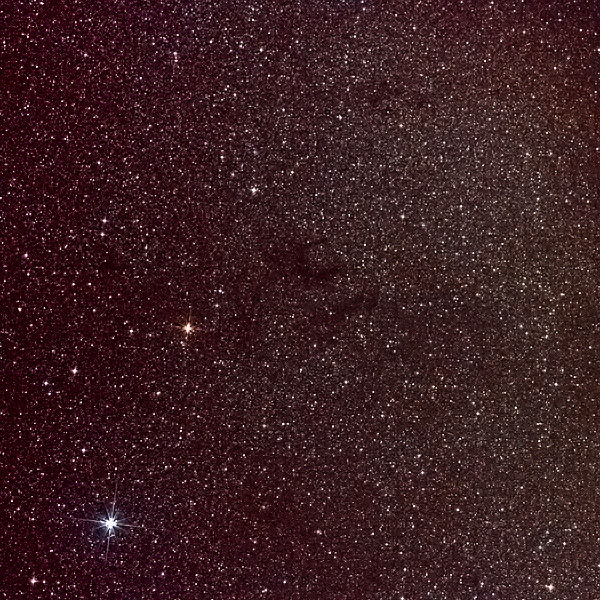
The clear weather continues, and I continue exploring what I can accomplish
from my backyard, in town, with lightweight equipment.
Here is a dark nebula (cloud of gas and dust that blocks light from distant stars)
shaped roughly like the letter E. It was discovered by E. E. Barnard
and catalogued as B142 and B143. The bright star in the field is Altair.
This is a stack of thirteen 30-second exposures with a Canon 60Da and Sigma
105/2.8 lens at f/4, on an iOptron SkyTracker.
Permanent link to this entry


|
2013
August
27
|
I have more names!
Effective today, the following three domain names are all equivalent,
both for web pages and for e-mail:
CovingtonInnovations.com
Covington-Innovations.com
CovInnov.com
Use of capital letters is of course optional.
The first one is the original
and main one; the other two are aliases (pointers).
I added the second one because some people were already wanting to put a hyphen
between the two words, and it improves readability.
(Why not "covington.innovations.com"? Because that's not available.
By definition, it would be part of "innovations.com", which is someone else's domain.)
I got the third one in order to have a short e-mail address.
Anything of the form "...@covingtoninnovations.com" is too long
for comfort; "...@covinnov.com" is more reasonable
(and will fit into small spaces on forms, etc.).
Permanent link to this entry


|
2013
August
26
(Extra)
|
Effect of an Astronomik CLS filter at my site
Here is a quick demonstration of the effect of an
Astronomik CLS filter,
which blocks portions of the spectrum that include most
of the emissions from mercury-vapor and sodium streetlights.
The filter produces curious-looking pictures with a blue-green
sky background and blue-green stars (until adjusted), but it
does help cut through the city lights.
Each of these is a single 30-second exposure with a Canon 60Da
and a 105-mm f/2.8 lens, under a town sky where the naked-eye
magnitude limit was about 4.5. To save time I worked with the
JPEG files that came out of the camera, using Photoshop.
Without filter and with filter, respectively:
 
After hitting "Auto Tone" to adjust brightness automatically:
 
After some further contrast stretching and color adjustment (not treating the two
images alike, but doing what looked best for each one):
 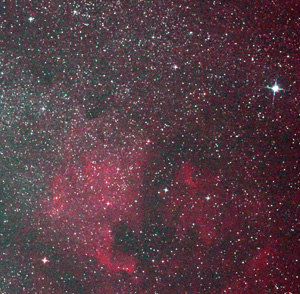
Not great, but not bad for a single 30-second exposure!
Permanent link to this entry


|
2013
August
26
|
The North America Nebula

Musicians have theme songs, and I have the North America Nebula.
To celebrate a rare occurrence of clear weather, and to further try out my
iOptron SkyTracker, I photographed my favorite nebula again, this
time from my driveway, because I couldn't go anywhere better on short
notice. This is an example of a poor observing site, lightweight equipment,
and an easy technique. Using a Canon 60Da, Astronomik CLS nebula filter,
and Sigma 105-mm f/2.8 lens, I took ten 30-second exposures and stacked
them with DeepSkyStacker, then did some postprocessing with Photoshop,
heavily favoring the reds.
Permanent link to this entry
Miscellany
Sadly, I had to miss Aunt Dorothy's funeral today (August 25) because of other
urgent family obligations closer to home. I particularly regret missing it because it may
have been the last gathering of the whole extended family in Colquitt County... unless
we organize something. Maybe some of the cousins would like to have a reunion
(even a very casual one) next summer when Melody and I are more free to travel.
Today my kitchen chores included going and buying a microwave oven on short notice.
Our inexpensive LG microwave oven from 2009 failed suddenly, and since failures of
the high-voltage, high-power components are almost always beyond economic repair,
we simply got a new one. Here's hoping it will last longer.
And another kitchen chore consisted of removing a bewildered 8-inch-long
earthworm from the breakfast room. How the worm got into the house, and in
particular how he got that far into the house without getting dehydrated
or injured, I don't know. But he looked healthy, and I need his services out
in the yard, so I carefully took him out there.
Permanent link to this entry


|
2013
August
25
(Extra)
|
A better view of Nova Delphini

Here is Nova Delphini in an unclouded sky. This is a single 30-second exposure
with a Canon 60Da and Sigma 105/2.8 lens at f/4. The star is in the center of
this cropped image. You may even be able to see that it is a bit reddish.
Permanent link to this entry


|
2013
August
25
|
iPhone meets Ford Escape
Modern conveniences I had not yet availed myself of...
When I connect my iPhone to the USB port of my Ford Escape's audio system
(2012-model Sync system), here's what happens...
The iPhone receives power from the Ford and charges its battery, of course.
If I do anything on the iPhone that produces audio, the audio is heard
through the Ford audio system, at normal volume.
If I tell the Ford to play music, it activates the music player on the iPhone
and even displays the song titles.
Handy! My biggest use for this is going to be Internet radio,
using the AT&T 4G network to listen to radio stations anywhere,
ranging from Atlanta news to exotic foreign broadcasters in languages
I'm trying to keep up (like Portuguese and German).
Permanent link to this entry


|
2013
August
24
|
A medical breakthrough by one of my former students
"Unconscious" patients can hear and communicate via fMRI
One of last week's big medical research headlines involved
my former graduate student Lorina Naci,
now at the University of Western Ontario.
While at UGA, she worked on
language in schizophrenia
but then moved on to even bigger things.
Dr. Naci's discovery is that
"minimally conscious" or "vegetative" patients, who cannot move any part of their
bodies, nonetheless can
answer questions by performing purely mental actions that can be detected through functional
magnetic resonance imaging (fMRI) of the brain.
(PubMed abstract here.)
This has important humanitarian implications because it shows that
these people can hear and think.
Permanent link to this entry


|
2013
August
23
|
Medical curiosity of the day:
Remote ischemic preconditioning
From several different places I've been hearing about an interesting discovery:
remote
ischemic preconditioning as a way to protect against heart damage
when a patient is undergoing heart surgery or other procedures that might cause
a blood clot to lodge in the coronary arteries. It may protect against
certain kinds of strokes, too.
What you do is squeeze the patient's arm with a blood pressure cuff for several
minutes before the risky surgery, or even shortly after the coronary occlusion has happened
(in that case it's postconditioning).
I'm not kidding. Whenever any muscle is deprived of blood, it sends out
chemical signals — not yet well understood — that tell all the
muscles to prepare to survive a reduction in blood supply. Then, if a coronary occlusion
happens, the amount of damage is much less because the heart muscle was already
on guard, so to speak.
And how much does the preconditioning procedure cost? Practically nothing.
This is a nice example of research improving health without raising costs.
Of course, if they can figure out how the chemical signals work, and replicate
them with an injectable drug, somebody's going to make a lot of money, and
they deserve to.
Permanent link to this entry


|
2013
August
22
|
Dorothy Roberts Miller, 1933-2013

My Aunt Dorothy, whose courtship story
you read here a few years ago,
passed away today (August 22) after a long illness.
Of all my aunts, Dorothy is the one who most resembled my mother, Hazel.
In Moultrie, around 1963, we briefly lived just a couple of blocks away.
Aunt Dorothy and Uncle Billy continued to live there, on 4th Street S.E. at
Pine Avenue, but we moved on to Valdosta.
Some time in the late 1960s, Aunt Dorothy impacted my career in a surprising
and useful way.
I don't know where she came by this information or why it was on her mind,
but she explained to me the difference between a scientist (in a research lab)
and a professor of science (teaching at a university).
I've been both, at different times, and have even mixed them in odd ways,
but I'm grateful to her for making me aware of the difference.
The picture above shows four of the Roberts girls in the late 1930s.
It appears in my book, Who's Who in the Roberts Family, which I
made for a family reunion in 2002. I do not distribute the book to the public
because it contains too much personal information about living people, but
I'll gladly send a copy to any relative who wants one, and to any bona fide
genealogist who needs one. Copies have been deposited in the Moultrie
public library and the Odum Library at Valdosta State University.
Permanent link to this entry


|
2013
August
21
|
Is your toaster spying on you?
If you Google the phrase "Is your toaster spying on you?" you will get a lot of
web sites dishing out various levels of alarm, ranging from mainstream media
to weirdos. I just Googled it and found some white supremacists. No telling where
else you might find it.
Underlying this catch-phrase is a strange mix of wise concern and misinformation.
The idea is that microprocessor-controlled household appliances might give away
more information about us than we wish —
especially since computer analysis of the data could detect patterns that
would not be obvious to an ordinary human being.
I think there are grounds for concern. But one thing people fail to realize — even some writers for
reputable web sites — is that we're mostly talking about
imagined or proposed technology, not technology that exists right now.
Lots of bad ideas have been proposed and shot down.
Some of these need to be shot down, too.
Your toaster is not presently collecting data about how often you
make toast and e-mailing it to the CIA.
But more to the point, machines don't talk to each other magically just
because they're machines. None of your appliances can communicate outside of your house unless
one of the following things is true:
- You have connected a phone line to it (as with some cable TV boxes).
- You have connected an Ethernet cable to it, linking it to your Internet service.
- You have given it the password (you do have a password, don't you?) for your home Wi-Fi service.
- It is on the cellular telephone network, which requires a subscription costing several dollars
per month (e.g., GM's OnStar).
Malicious spies could do two other things. They could set up some kind of password-protected
Wi-Fi that is reachable from your house but with which you are not familiar. You would think
this is a neighbor's network and would not be able to use it, but a suitably programmed
device in your house could do so. (Maybe. House-to-house Wi-Fi range is hard to achieve.)
Or they could use the cellular network and pay for the usage themselves.
Law-enforcement-agency GPS tracking devices do this.
But all six of these are unlikely with a toaster! Who would want to go to the expense?
Toasters compete on cost.
I do think we should be cautious about putting everything on the Internet just because we can,
especially if access from outside the house (beyond your LAN) is enabled.
Whenever you run a server accessible to the outside world, security becomes a big responsibility.
There has been a recent scandal involving the "hacking" (unauthorized remote access) of a baby monitor.
I'm guessing (though I don't know) that the owner may have picked a very simple password such as "abc" which
others could easily guess; or maybe there was a design flaw.
In any case, I wouldn't want a baby monitor accessible outside my LAN —
what purpose would it serve?
I wouldn't even want a remotely accessible thermostat, I don't think, unless the needs outweighed
the risks and I had confidence in the security of the system.
Two final notes. GPS satellites do not know where you are when you find your position
with a GPS receiver. The computation is done in your receiver. The GPS tracking devices that
you hear about in the newspapers are something different; they use the cellular telephone network
to report your position.
And, finally, yes, the phone company knows where your cell phone is, all the time, including iPads with 3G,
which use the cellular network. Cell phones couldn't work any other way. The network has to locate
it in order to assign it to the nearest tower and hand it off to the next one at the right time.
A telephone is a communication device and does not keep its position secret. It is a little
radio beacon that is constantly tracked by the cellular system. If you don't want your position to be
tracked, turn it off.
Permanent link to this entry


|
2013
August
20
|
Nova Delphini amid moonlit clouds
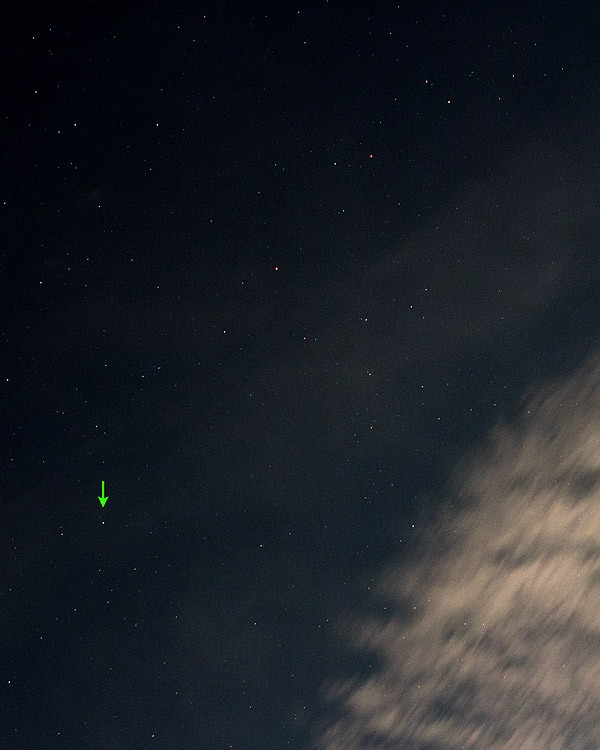
Sometimes you take what you can get. Our skies have been cloudy continuously for
several days, during which Nova Delphini has flared up (observed by astronomers
elsewhere) and begun to fade after peaking at magnitude 4.4 or so.
Under better conditions I could have seen it with the unaided eye.
As it is, I managed to see it with binoculars and
grab a photograph through a gap in the clouds, with
the moon nearby. Single 5-second exposure on a fixed tripod, Canon 60Da at ISO 1000, Canon 50/1.8
lens at f/4, at about 21:30 EDT on August 19. The arrow-shaped constellation Sagitta
is at the top. This is a cropped portion of a wider-field picture.
Not as bad as it might have been...
Permanent link to this entry


|
2013
August
19
|
Idea of the day
I've launched an idea out on Facebook, and I hope it spreads and catches on.
It is this:
People who spread hoaxes and deliberate misrepresentations of fact should be unfriended
(removed from one's friend list).
I'm getting tired of hot, juicy stories whose credibility is almost on the
level of, "Obama is from Mars," and which are spread by people who make no attempt
to check out the facts. Anybody can be mistaken, but if there is no sign
of a credible source — just a "friend" eager to spread gossip —
then that person is not really a friend.
Those of us who know right from wrong
have a duty to discourage malicious gossip, and that can include use of the "Unfriend" button.
Permanent link to this entry
The personal character of good computer programmers
I've just reread the second edition of McConnell's
Code Complete,
a great book.
Taking his ideas as a jumping-off point, here are some thoughts about the
personal character of good computer programmers.
Humility is good; fanaticism is bad.
Computer programming is almost too hard for human beings to do.
A wise programmer does not overestimate his or her intelligence.
He or she doesn't try to juggle too much information at one time.
The good programmer keeps everything clear and organized.
Fanaticism — the attitude of the computer maniac who wants to be a computer — is
not a sign of talent. Nor are all-night work sessions or coding marathons. Those are close to being a
sign of incompetence or mismanagement. As I tell my students about academic work,
"If you have to stay up all night to
write a 10-page paper, what are you going to do when it's time to write a 100-page thesis? Stay up
ten nights in a row?" A deadline is not an emergency, and artificial emergencies are not good management.
High quality costs less than low quality. Programmers have to charge by the hour
because nobody can predict how much time a programming task will take.
Bad programmers take vastly more hours than good programmers, especially when you count the time
spent finding defects later and fixing them.
Good programming may cost more per hour, but it's cheaper in the long run, and even in
the short run.
A corollary is that having to spend a lot of time debugging is a bad sign.
Programming should not be a matter of trial and error.
Good programming practices prevent errors, or catch them so quickly that
a long search is rarely needed. "Write it today, spend the rest of the week
debugging it" is, nowadays, a sign of failed methodology unless there are unusual
challenges involved, such as interfacing to external equipment.
Experience is a two-edged sword.
As McConnell points out, if a person can't master a programming language in two years,
he or she never will.
Older programmers who have not been keeping up may simply be unaware of
newer techniques.
On the other hand — speaking as an old programmer — I can assure you that
my knowledge, above the level of individual programming languages, has grown as I've aged.
I'm better at what McConnell calls "programming into the language rather
than in it." That is, I'm less driven by what I know is available, and more
driven by knowing what I want to do, knowing I'll find or build the tools necessary
to do it.
Beware of buzzwords, fake sophistication, and cargo-cult programming.
A brand-new graduate who can name 35 different refactoring patterns, and who
can't resist talking about them all the time, may lack creativity.
This may be someone who thinks only of using the tools already in the kit.
I'd rather have someone who doesn't put names to any refactoring patterns
but can reorganize and speed up a program by understanding how it works.
Likewise, a programmer should not want to use "advanced techniques" whether or
not they're advantageous. I've seen code written by great programmers
(Kernighan, Hejlsberg, Wirth), and it's simple. It often looks like
something from the earliest chapters of a programming textbook. There is no need
to put in "advanced features" just to show that you know about them.
The buggy PC software of the 1990s came, I think, partly from the extensive
unnecessary use of pointers, an "advanced" but error-prone feature of the C language.
Nor do I admire absolute rules like "Never code a go to statement"
or "Never let a class have a public field." People who say things like these
are showing me that they haven't thought about the (admittedly rare) exceptions.
I once heard someone say, "I'd fire any programmer who used a go to
statement." I couldn't think of how to reply diplomatically at the time, but I think my
answer should have been, "Then you would have fired Knuth and Hejlsberg. And did you
realize the C# language specification
actually recommends the use of go to in one
particular situation? Do you know what it is?"
Admittedly, I only use go to about once every three years.
But I reserve the right to do so. And I understand the point about not having
public fields, but it's a trade-off.
It's a short step from irrational rules to what I call
cargo-cult programming,
putting things in because they "look right" or "look sophisticated" rather than
because they solve the problem. Students learning Prolog often go through a phase
of wanting to put state variables and tail recursion in every predicate, as if these
were necessary parts of the programming ritual. This blinds them to situations
where other approaches are better.
Similar things happen in other languages and environments.
Permanent link to this entry


|
2013
August
18
|
iPhone notes
A few notes about the iPhone...
It is serving me well, but it is a totally locked down, unprogrammable
computer. As I said yesterday, the trade-off between safety and freedom
is different than with other computers. You can't program your iPhone at all
(as far as I know). Even if you are a registered iOS developer, you can only
run your software on a simulator on a Macintosh. The only way to get it onto
an iPhone is to submit it to the App Store. (Can this be true?
Are there no scripting languages, programmable calculators, or anything
like that for iOS?)
To get music and podcast files from my PC onto the iPhone, I use iTunes
(free, installed on the PC).
To transfer other kinds of files is more problematic.
Dropbox is one solution; Google Docs
is another, and there may even be something through iCloud.
The iOS operating system is, it turns out, built on MacOS, which is built
on BSD UNIX. (I did not at first realize there was any relation between
iOS and MacOS.) iOS is practically virus-proof for three reasons.
One is that there aren't many viruses for MacOS in the first place.
The second, more important, reason is that there is no way for software
to get onto the iPhone except through the App Store.
And the third reason is that iOS doesn't have a file system in the
traditional sense — files are owned by one or more apps and are not
usable independently. To transfer a file from one app to another that is
eligible to own it, you "open in" the new app. In this way PDF files arriving
in Dropbox can be opened in iBooks, for example.
That's as much as I understand right now. Corrections are welcome.
I recommend Wal-Mart as a source of modestly priced USB and audio cables,
car chargers, and the like. Everything at Best Buy has gotten expensive.
For three decades, every time I went into a consumer electronics store, I
was surprised at how much the prices had fallen. Not any more.
Permanent link to this entry


|
2013
August
15-17
|
iPhone success
[Revised.]
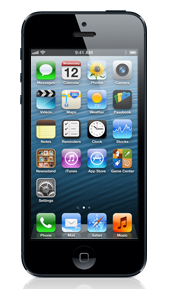 I have again joined the iPhone club, this time successfully.
This time I got an iPhone 5, and the cellular reception is as good as with any
other cell phone I've used. So the one I tried a few days ago must have
been defective.
I have again joined the iPhone club, this time successfully.
This time I got an iPhone 5, and the cellular reception is as good as with any
other cell phone I've used. So the one I tried a few days ago must have
been defective.
Here are a few observations about how I'm using it.
(I'm not new to iOS, having had a University-issued iPod and then iPad,
so right now I won't comment on anything technical.)
The goal is to simplify my life, not complicate it. I'm not taking up iPhoning as a new hobby,
as some people do. I have plenty of other computers.
The iPhone is my servant, not the other way around.
I have told it not to beep when I get e-mail, or any of my friends posts on Facebook,
or any number of other trivialities. It rings for incoming phone calls and buzzes for text
messages, and that's that.
Putting this another way, I'm not one of the people with an interruption-driven mind.
Some people apparently require constant interruption — they want electronic communications
to interrupt them every few seconds all days long — and they seem unable to think when
left to themselves. That is not what I am or want to be.
Ubiquitous Web and e-mail access is handy. In our climate, weather radar maps are useful
on the spur of the moment. So are numerous other kinds of information. And if I'm expecting
e-mail, I can get it, even if I'm away from Wi-Fi.
It helps me use time that would otherwise be wasted. I can handle e-mail while standing in line for
lunch, waiting for a bus, or the like. Not only is this good for the people who are trying to
reach me, it also means that there is no longer a pile of unseen e-mail waiting whenever I
sit down at my PC. That is a quite noticeable change.
It's a pocket device. I chose the iPhone rather than a 3G iPad because I already
always carry a telephone, and I wanted to pack more functionality into the same space.
I already have a lightweight laptop that I can carry around when I want to carry something.
The purpose of the iPhone is to be with me even when I'm not carrying anything other than the
usual contents of my pockets (and, in its case, belt clip).
It's remarkably multifunctional. Besides a telephone, it's an MP3 player, web browser,
e-mail reader, surprisingly good camera, audio recorder,
GPS device, library (containing everything from the Bible to star maps),
and scientific calculator. I get all this without having to carry any more gear around with me
than I was already carrying.
The trade-off between freedom and safety is quite different than with a PC.
This is not personal computing — it's participation in Apple's network.
Wherever I go with it, Apple and AT&T track the location.
There is cloud backup, which is convenient but also means that any information I put
in my iPhone can also go to an Apple server somewhere, and it might be compromised either
there or in transit. Accordingly I never put information on the iPhone that
would be seriously damaging if made public. Clean-living fellow that
I am, I don't have much information that would be seriously damaging if made
public; the only examples I can think of are other people's business plans and,
very occasionally, information about computer security investigations or the like.
Let's never forget that this is a communication device.
Equally, let's never forget that there's such a thing as enough security.
I'm not afraid to do mobile banking through the 4G wireless network. It's safer than
Wi-Fi, and if anyone does break in, it will be perfectly obvious what they're doing.
They can't "take my money" — they can only tell my bank to give them my money,
and if the bank accepts this order from an impostor, it's ultimately the bank's problem.
Likewise, and going counter to the latest wave of paranoia, I have chosen to allow location tagging
of the pictures I take with the iPhone. "But people are going to find out where you are!"
Well, when I distribute a picture I generally say where it was taken, anyhow.
"Here's my picture of the Eiffel Tower but I can't tell you where I took it" — not.
I don't distribute pictures of anything too private for the location to be divulged.
Permanent link to this entry


|
2013
August
14
|
A decentered lens element

The 200-mm lens that I tested yesterday has gone back to the seller
because of a problem. I'm not naming the make and model because it is
from an excellent manufacturer — but bad luck can happen
to anyone.
There is a lot of unit-to-unit variation in camera lenses, and the most
common fault is decentration (bad centering), meaning that one of
the elements is not quite centered relative to the others.
Often, all the lens needs is to be taken apart and put back together;
an element might be slightly loose in its mounting.
That's what happened here. Above, you see a small area from the very
center (that's important!) of a picture of a star field.
As you can see, the star images are not symmetrical. They're sharp at the
top edge and blurry at the bottom edge, as if the top edge were closer to
the sharpest part of the field. That is how
star images should look well below the center of the picture, where
unavoidable edge-of-field aberrations would be taking their toll.
Looking at the whole
image, you'd see that the "sweet spot,"
with the sharpest stars, is not centered as it ought to be;
it's way up high.
I reproduced the problem with about a dozen images. A single bad image
might be a fluke due to bad guiding, unsteady air, or something like that.
Further, this test image was never JPEG-compressed; it was converted from
raw to TIFF with Photoshop and only converted to JPEG after being magnified
and evaluated.
(JPEG often does funny things to star images.)
Further, I saw the problem when focusing on a bright star using Live View at
high magnification — it looked like a telescope out of collimation.
This is a conventional 200-mm lens of premium quality.
The amount of decentration that you see here might be undetectable
on film (versus an 18-megapixel sensor), and it might be entirely
within spec for a low-end lens — but not the high-quality
lens I was testing.
This was a conventional telephoto lens.
I'm told that image-stabilizing (IS or VR) lenses never have
perfect centering because one of their elements is always movable (to
stabilize the image). That's why I don't use them for astronomy.
Permanent link to this entry


|
2013
August
13
|
Handheld autofocused moon

I have a new 200-mm lens. To test its sharpness,
I took several careful photographs of the moon using a tripod and
manual focusing, and then I decided to try one handheld, with
autofocusing. That is, I just aimed the camera at the moon and
pressed the button.
Here is the result, bearing in mind that this is a small area from
the center of the picture (200 mm is not that much magnification).
1/1250 second, f/4, ISO 800, Canon 60Da. Postprocessed with Photoshop
to increase contrast, sharpen detail slightly, and remove grain.
Permanent link to this entry


|
2013
August
12
|
Lagoon and Trifid Nebulae

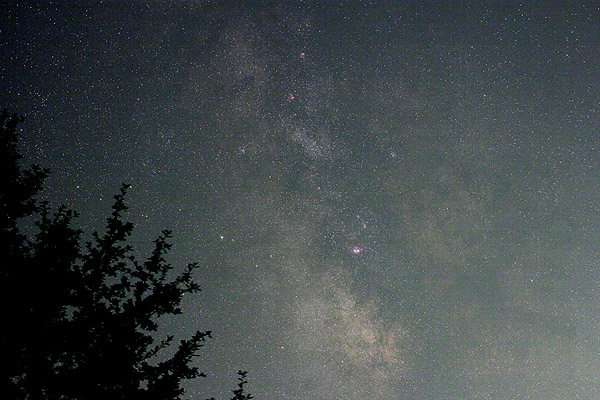
We still have stars in the sky, and although conditions weren't great
on the evening of the 10th, I was trying out my ultra-portable equipment
to make sure I'm ready for Comet ISON.
The first picture is a stack of four 30-second exposures with an old Olympus 200-mm f/5 lens
on my Canon 60Da, with long-exposure noise reduction (automatic dark frame subtraction),
postprocessed with DeepSkyStacker and Photoshop. Tracking was done with an iOptron SkyTracker,
which performed admirably. You can see the Trifid Nebula at the top and the Lagoon Nebula
at the bottom.
The second picture is a single 30-second exposure through a much wider-angle lens, a Canon
40-mm "pancake" lens. You can see the same two nebulae near the center.
Permanent link to this entry


|
2013
August
11
(Extra)
|
My 75 minutes of iPhone ownership
[Updated.]
For 75 minutes this afternoon, I owned an Apple iPhone 4.
AT&T was offering it for 99 cents with a contract renewal
and a data plan.
I had been wanting a phone with 3G or 4G wireless service, so
I took the plunge.
I went to the AT&T store and told the salesman about my
needs, including reception in a rural area.
He assured me that the iPhone 4 had good reception in such circumstances.
I got it home and had no trouble putting it on the local WiFi
network and synchronizing with my Apple account (left over
from when I had a UGA-issued iPad).
The trouble is, it wouldn't connect to the cellular network.
From my desk downstairs, I couldn't make phone calls at all.
From out in the carport, I was able to make a call with a very
weak signal.
So, back to the AT&T store. They told me that all warranty
issues (even dead-on-arrival equipment) were the responsibility of the Apple dealer,
not AT&T. They offered to take it back for a $35 restocking fee.
I replied with some exhortations about
implied warranty of merchantability,
warranty of fitness for purpose
(since I had specifically asked about rural use),
and the general notion of standing behind one's merchandise.
If merchandise is defective at the time of sale, or not usable in the way the
seller claims, that's the seller's problem.
And someone at AT&T admitted that
the iPhone 4 has notoriously bad reception
("and that's why it's 99 cents").
So they agreed to undo the whole transaction,
which included programming a new SIM card for my old phone, and I'm back to my trusty
Nokia 7020, complete with idiosyncratic headset connection and other quirks,
and disappointed that I can't use a smartphone.
Follow-up: I went to the local Apple dealer
the next day to see what they knew about problems like this.
They said they would have sent me right back to AT&T on suspicion of having a defective SIM card
(with an intermittent connection). They also said that all iPhones have reception somewhat poorer
than conventional cell phones. I thanked them profusely for being willing to understate
the performance of their products. Those are the kind of people I want to do business with.
Further follow-up: A friend's iPhone 4S works fine at my house, even better than my old Nokia;
there is no indication that its reception is poor. I'm going to try again with another new iPhone,
probably a 5 or 4S.
Permanent link to this entry


|
2013
August
11
|
Not your grandmother's washing machine
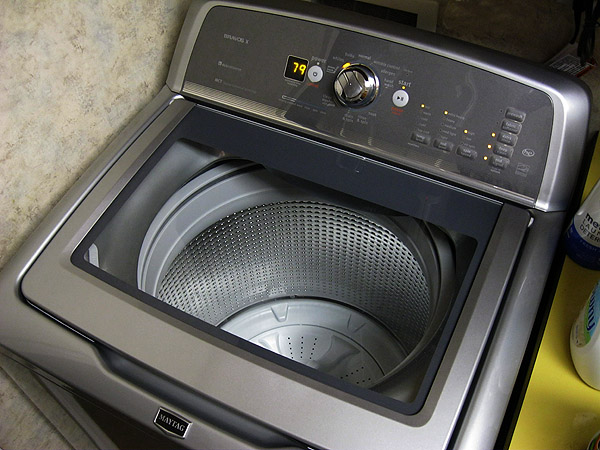
To celebrate our 31st anniversary, Melody and I did something not
very romantic — we bought a new washer and dryer.
We actually could not remember how old the old ones were —
more than 20 years, we're sure.
The new washer is an HE (high efficiency) type, which is the
first change in washing-machine technology in our homes
within our lifetimes. (We are both just a tiny bit too young
to have used a wringer machine, although we remember when
they were common.)
The key idea is, there are two ways to wash a piece of cloth.
You can swish it around in a bucket of water,
or you can wet it thoroughly, squeeze it out, wet it thoroughly again,
squeeze it out again, and so on.
Conventional washers do the first of these; high-efficiency (HE) washers
do the second, using a good bit less water. Because they spin the water
out, they don't move the clothes around as much as a washer with an agitator.
(They do swish it around in water to some extent, just not as much.)
That will save wear and tear. And it is less of a load on the hot water heater.
We may be able to take baths while laundry is being done.
A good many people on the Internet have found HE washers disappointing,
but ours is serving us very well. Here are some key points.
- Follow the instructions. I suspect a good many of the people who are
disappointed are trying to use an HE washer just like an old-style one.
- Use only HE detergent, and not too much. You may need less
than the instructions say. More is not better. Don't add powders
or anything the instructions don't call for.
- High efficiency does not mean super-speed. It means water-saving.
By the way, contrary to the display you see above, it doesn't take 79 minutes
to wash a load. An accurate number is displayed as soon as the washing starts.
But it does take a little longer than a conventional washer.
Permanent link to this entry


|
2013
August
10
|
The University of Georgia has its own star
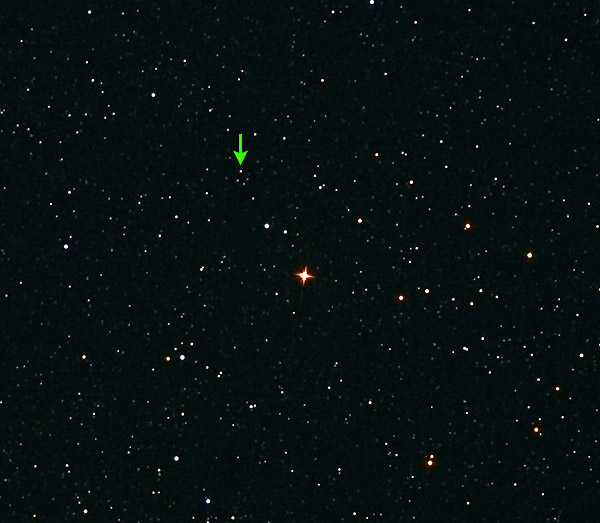
The star
Kepler-37,
which
has a planetary system,
has been named "UGA-1785"
in honor of the University of Georgia, which was founded in 1785
and opened in 1801, right when the light rays now reaching us
from this star started their journey.
I don't mean that somebody registered it with the International Star Registry or a
similar unofficial enterprise. The name "UGA-1785" is
at least
semi-official, designated by NASA at the initiative of a UGA alumnus who was involved in discovering it.
Most astronomers, however, will continue to know this star as Kepler-37,
GSC 3131-1199, or TYC 3131-1199-1. It is at 18:56:14 +44°31', magnitude 9.7,
and is the northernmost of a diamond-shaped group of four stars just north of 13 Lyrae,
centered in the picture above. That, in turn, is a few degrees northeast of Vega.
Last night I took a picture of it. What you see is a stack of four 30-second exposures
with a Canon 60Da and Sigma 105/2.8 lens at f/4, on an iOptron SkyTracker, with long
exposure noise reduction (automatic dark frame subtraction).
Permanent link to this entry
How to know whether you know what you're talking about
This came up in conversation the other day, and it's a key concept I've relied on
when teaching.
To learn anything, you have to know whether you understand it, and some
people are often mistaken on that point.
When a person's understanding of a subject seems foggy, or when he's having
trouble understanding something that he's reading, I start asking him
to define words. If you're talking or reading about an relational database,
then tell me what a database is, and what makes it relational. If you can't
do that, then you may be referring to a relational database,
but you don't understand it, even if you think you do.
It's all too easy to use a word without knowing what it means,
especially if it's a technical term and you know some of the things that it
refers to. Some people don't realize that isn't enough. If you can point out
a few dogwood trees because I told you they are dogwoods, but you don't know how
to tell whether other trees are dogwoods, then you don't know what "dogwood"
means — do you?
That's how Dilbert's boss can demand a relational database without having
the foggiest idea what one is.
In a few cases, using a word without understanding it can be legitimate.
The clerk at Radio Shack can sell me a capacitor without knowing what a capacitor is
(except that it's an electronic part with the word "capacitor" on the package).
That's how Radio Shack stays in business without having to pay electrical-engineer-level
salaries to clerks. What's important, when you're in that kind of situation,
is that you must not imagine that you know more than you actually do.
Permanent link to this entry


|
2013
August
5-9
|
Short notes
I have several writing projects going on (one of them related to the series
of entries I just finished about Internet safety) and am not going to be
blogging much. But don't worry, I'm still here.
I have also recently been looking into multithreading
in WPF...
and preparing for the arrival of a Maytag Bravos washer and dryer today (August 8),
ushering us into the high-efficiency (low-water) laundry world. I'll write about
how well it works.
Permanent link to this entry


|
2013
August
1-4
|
Is gossip taking the place of knowledge and truth?
[Minor revision.]
With the rise of social media, gossip is playing a larger role
in people's lives — including people who ordinarily would be smart
enough not to be taken in.
What I mean is this.
Fifty years ago, people got their information from news media and,
when needed, reference books.
These weren't perfect — there was a lot they didn't tell you —
but at least they seldom knowingly spread falsehoods.
Today, people get their information from "copy and repost" and "a friend of a friend
forwarded me this so it must be true."
The opportunities for believing and spreading lies are endless.
When something spreads by "copy and repost" or "retweet" or "friend of
a friend," nobody is taking responsibility for it.
Some people can't resist believing anything that's "juicy," especially
if it says somebody else doesn't want them to know about it,
regardless of whether there's any reasonable chance that it's true.
A recent example: "Margarine is made of liquid plastic."
A lengthy essay to this effect, with no author identified, is spreading
across Facebook.
Now, in any saner era, a person might look in an encyclopedia
(printed or on line) to find out what margarine is made of
(or even look at a margarine box). The answer: Vegetable oil.
A saner person might also wonder why someone wants to make you believe margarine
is inedible. Is this just an individual with odd opinions, or is it maybe a shill
for the dairy industry, which has always hated margarine and tried to discredit it?
But now that we live in the "copy and repost" era, otherwise sensible people
will spread hoaxes or misinformation without checking.
"Repost it to show that you care." (No, thanks!)
A word to the wise:
If you are not familiar with
Google,
Wikipedia,
and
Snopes,
please go and get acquainted with them immediately, before you
post anything else on the Internet.
They're not infallible, but they will tell you quickly whether there's
more to a story.
I have seen plenty of bad health advice, and even some
advice to mix household chemicals dangerously, all circulating
via "copy and repost."
Suppose you pass along some bad advice and it harms someone.
You may not know who started circulating it. Everybody knows that you
passed it on. You're responsible.
Permanent link to this entry


|
|
|
This is a private web page,
not hosted or sponsored by the University of Georgia.
Copyright 2013 Michael A. Covington.
Caching by search engines is permitted.
To go to the latest entry every day, bookmark
http://www.covingtoninnovations.com/michael/blog/Default.asp
and if you get the previous month, tell your browser to refresh.
Entries are most often uploaded around 0000 UT on the date given, which is the previous
evening in the United States. When I'm busy, entries are generally shorter and are
uploaded as much as a whole day in advance.
Minor corrections are often uploaded the following day. If you see a minor error,
please look again a day later to see if it has been corrected.
In compliance with U.S. FTC guidelines,
I am glad to point out that unless explicitly
indicated, I do not receive substantial payments, free merchandise, or other remuneration
for reviewing or mentioning products on this web site.
Any remuneration valued at more than about $10 will always be mentioned here,
and in any case my writing about products and dealers is always truthful.
I have a Tektronix
TDS 210A oscilloscope on long-term loan from the manufacturer. Other reviewed
products are usually things I purchased for my own use, or occasionally items
lent to me briefly by manufacturers and described as such.
I am an Amazon Associate, and almost all of my links to Amazon.com pay me a commission
if you make a purchase. This of course does not determine which items I recommend, since
I can get a commission on anything they sell.
|
|





















